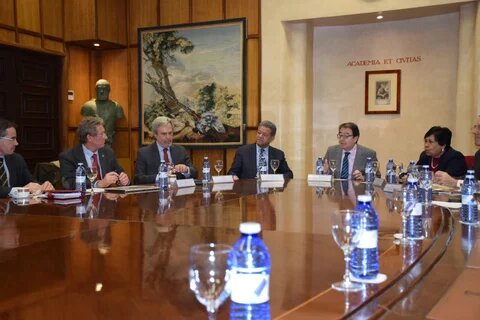Last Friday, President Fernández started a work agenda in Europe as president of the EU-LAC Foundation, which includes Madrid (Spain), Berlin and Hamburg (Germany) .
MADRID (Spain) – Dr. Leonel Fernández, in his capacity of President of the EU-LAC Foundation, raised the need to direct efforts towards the internationalisation of all universities all over the world, with the aim to enhance the capacity of the students and that an increasing number of people have access to higher education.
Fernández presented this approach during a conference on “The future of Higher Education”, event that took place at the University of Alcalá and was attended by the Executive Director of the EU-LAC Foundation, dozens of academics and students, as well as special guests.
In his conference, the President stated that it is not just about internationalising every university exchanging students and teachers, but of reflecting on new inter-university and inter-disciplinary degrees and formative profiles to be created, in order to properly connect them with the new demands of the global society.
In the opinion of Fernández, this effort implies rethinking the structure of the universities, as well as its funding, origin and mobility of their students and the profile of their teaching staff. In the same vein, he expressed the view that synergies must be created to expand the excellence of knowledge and education, pointing that the universities should be more universal and less local in the future.
In his statement, President Fernández also highlighted the great transformations that higher education experimented throughout the 20th Century, emphasizing, among them, on the emergence of relevant elements such as massification, internationalisation and the digital revolution.
Similarly, he stressed that, in the last decades, higher education has been globalised with the consolidation of English as the dominant language among the academic and scientific global community, and the existence of 3 million students taking courses abroad, amount that will increase to 8 million by the year 2020, being the United States the most recipient country and China the one that sends the most.
Fernández added to the latter the fact that information and communication technologies created a universal medium for instant contact and simplification of the scientific communication, channelling the access to database and scientific publications.
Likewise, he stressed the impact of the massive open online courses (MOOCs), a system that promotes high-quality higher education wherever an Internet connection exists, and that also has the potential of widening the linguistic and cultural gap that currently predominates over the cyberspace.
Looking ahead, Fernández said that steps must be taken with the aim of achieving the adaptation of the higher education institutions to the new social demands; improve the quality and the competitiveness of the universities and relaxing the project and application of the curriculum content, as well as incrementing the funding for studies and higher education.
“The difference between developed countries and developing countries has traditionally been substantiated in the unequal economic development. In the 21st Century, this difference is based, basically, on the information and knowledge gap generated among nations”, he said.
“For these reasons, never before have the universities been commended to play such a significant and transcendent role, as being one of the main instruments of transformation for the human being”, concluded President Fernández.
